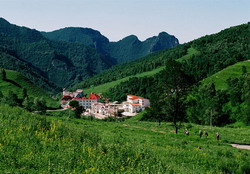Hiding in the mountains
 0 Comment(s)
0 Comment(s) Print
Print E-mail
China.org.cn, May 19, 2008
E-mail
China.org.cn, May 19, 2008
Summer may well be the worst season in Beijing, when the weather is so sweltering that even the air you breathe sears your throat. It may be difficult to decide whether to leave the comfort of an air-conditioned room and to step into the strong sunshine and endure soulless skyscrapers, seemingly endless traffic jams, jammed buses and the short tempers which make the day intolerable.
On the other hand, summer can be the best season in Beijing if, like the ancient imperial courts, you make up your mind to leave the city and hide out in the summer resorts among the mountains in Mentougou District in the western suburbs of Beijing. Cool breezes and tempting views await you in this season.
Experience Tibetan Lifestyle in Beijing's Mount Everest

Guozhuang dance parties, ghee tea and yak races, one might have the impression of arriving in Tibet, while you're enjoying your summertime in Beijing's Mount Qomolangma (Mount Everest)-Ling Mountain, where the eighth Tibetan festival is held.
With the Qinghai-Tibet Railway beginning operations on July 1, people's interest in Tibetan culture continues to increase. As the starting line of the 109 National Highway leading to Lhasa, the capital of Tibet Autonomous Region, Ling Mountain opens a window to the Tibetan culture, saving you the trouble of spending two days on the train.
With a height of 2,303 metres, Ling Mountain is the highest mountain in Beijing, where the physiognomy, vegetation and weather is similar to Yushu State in the Qingzang Altiplano. There's snow on the mountain during three seasons of the year, with open and flat grassland. Ling Mountain has rich animal and plant resources, including more than 700 animals and 800 plants for a travellers'enjoyment. The average temperature in the summer here is 13 degrees Celsius lower than in urban Beijing, which makes it an ideal summer resort.
The annual Tibetan festival is a unique feature of Ling Mountain, with more than three million yuan (US$37.5) invested in its eighth instalment in 2006. Running from July 16 to September 16, there is a daily professional Tibetan song and dance show. Travellers can join Tibetan dancers in a Guozhuang dance around a campfire and amuse themselves by attending Tibetan-featured sports such as push-and-pull, yak racing and archery. Visitors can also taste Tibetan local specialties like ghee tea, Tibetan barbecue and yogurt. For souvenirs, people can purchase traditional Tibetan handicrafts and medicinal materials grown in Tibet such as aweto.
To go to Ling Mountain, take tourist buses available at the Qianmen, Chongwenmen, Dongwuyuan (Beijing Zoo), Dongdaqiao and Pingguoyuan subway stations. For more information about the mountain and the Tibetan festival, please dial: +86 10 6182 7994.
A Visit to the Paradise of Wild Animals and Plants in Beijing
About 110 kilometres west of Downtown Beijing, the Baihua Mountain Forest Tourism Area is dubbed a "Paradise of wild animals and plants." The forest coverage rate is more than 90 percent and the 1,977-metre-high Baicaopan is the third highest peak highest in Beijing. From it, the CCTV tower and Jing Guang Centre in Beijing can easily be seen.
The place is also called North China's Natural Animal and Plant Park. There are 1,100 different plants and 170 different animals including rare wild leopards. The varied topography and geologic characteristics are fascinating. Varied shapes of stone "castles" can be found everywhere thanks to geological movements. For a unique view, travellers can take a cable car through the Baicaopan area.
This is a relatively cool place with an average temperature of 22 degrees Celsius on hot summer days, 6 degrees lower than in the downtown area. There are 35 scenic sites, including some temples dating to the Ming Dynasty (1368-1644).
Beijingers are advised to get up at the crack of dawn and drive to the site. The 110 kilometres will take two hours or more. Be prepared for a switch back mountain ascent which increases driving time. If you want to climb to the top of the peak, it will take at least six hours there and back. It's important to bring adequate food and water.
The first Baihua Mountain tourism festival that began on July 15 will continue for three months, with the theme of : "Forest, Mountain, Green and Environmental Protection." During the festival, through ecological summer camps, lectures on environmental protection and mountaineering races, organizers hope to provide travellers, especially children, a better understanding of mountain and forest habitats and to strengthen their awareness of environmental protection.
Baihua Mountain has satisfying facilities for dining, accommodations and entertainment. The Baihuashan Hotel is located at the base of the mountain.
Travel tips:
The entrance fee to the mountain is 25 yuan (US$3).
More details can be obtained by dialling: 010-6182 6110.
Go to Forum >>0 Comment(s)